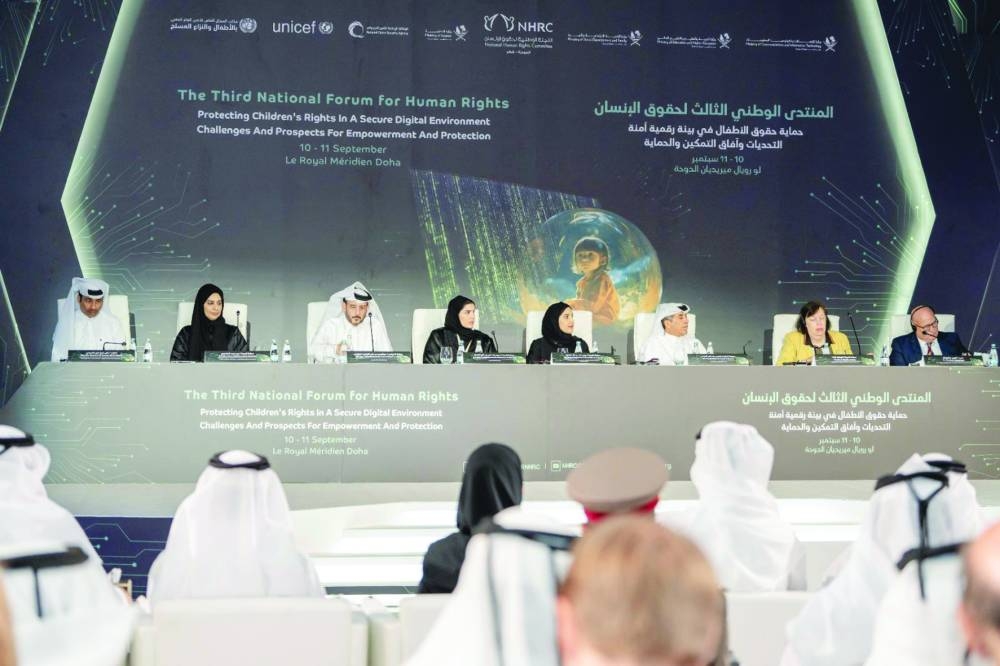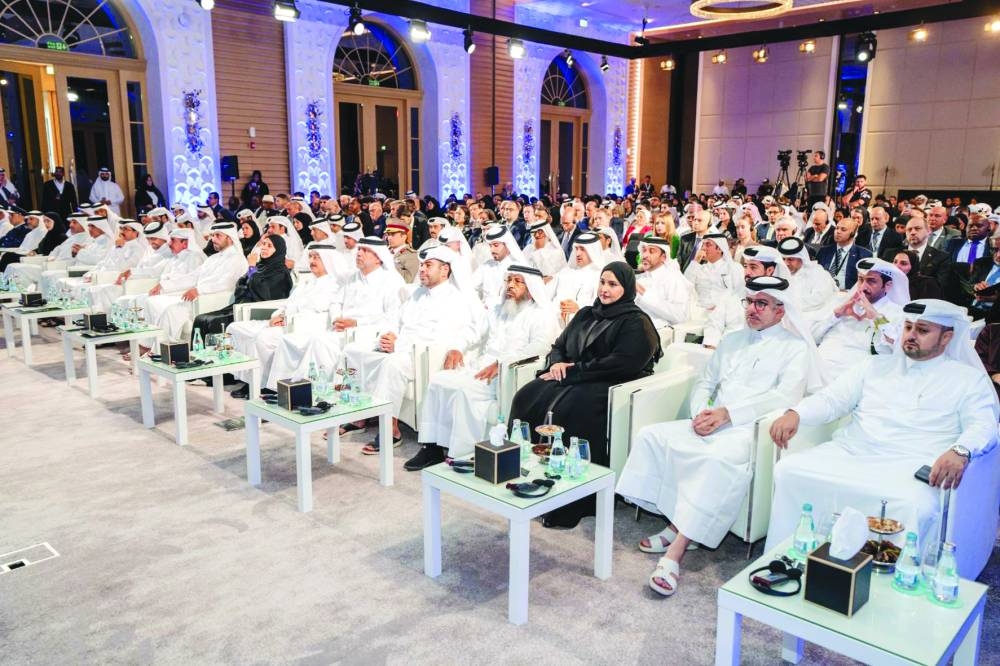The third edition of the National Human Rights Forum kicked off Tuesday, organised by the National Human Rights Committee (NHRC) in partnership with the Ministry of Interior, the Ministry of Communications and Information Technology, the Ministry of Education and Higher Education, the Ministry of Social Development and Family, and the National Cyber Security Agency.
This year, the forum is held under the theme of protecting children's rights in a safe digital environment, with a focus on the challenges and prospects for empowerment and protection. The forum is held in collaboration with the UN Children's Fund (Unicef) and the office of the Special Representative of the UN Secretary-General for Children and Armed Conflict. The event saw the participation of over 600 officials, experts, specialists, and students from universities and schools.
The opening session was attended by HE Chairperson of the NHRC Maryam bint Abdullah al-Attiyah and Chairperson of the Global Alliance of National Human Rights Institutions, HE Minister of Transport Jassim Saif Ahmed al-Sulaiti, HE Minister of Municipality Abdullah bin Hamad bin Abdullah al-Attiyah, HE Minister of Justice and Minister of State for Cabinet Affairs Ibrahim bin Ali al-Mohannadi, HE Minister of Social Development and Family Maryam bint Ali bin Nasser al-Misnad, HE Deputy Speaker of the Shura Council Dr Hamda bint Hassan al-Sulaiti, and other officials from various state institutions.
The two-day forum aims to create a platform for national dialogue among ministries, public institutions, civil society, parents, and children on the latest developments and challenges related to children's rights in the digital environment. It seeks to provide insights into enhancing legislation, public policies, administrative measures, procedures, and practices related to the prevention, empowerment, and protection of children in the digital space based on a human rights approach. It also seeks to examine best practices within the country and internationally, promoting measures related to protecting children's rights in the digital space. Additionally, the forum aims to empower children with their right to a safe digital environment while considering Islamic values and national identity, alongside raising awareness of the importance of providing children access to the digital world while protecting them from potential risks.
In a related development, the Ministry of Labour, represented by the National Committee to Combat Human Trafficking, participated in the forum.
Sheikha Najwa bint Abdulrahman al-Thani, who is the Assistant Undersecretary for Expatriate Workers Affairs at the Ministry of Labour and Secretary of the National Committee to Combat Human Trafficking, attended the forum's opening session.
Fatima Rajab al-Ismail, who is a member of the Secretariat of the National Committee to Combat Human Trafficking, presented a paper on measures to prevent the exploitation of child labour on the Internet, noting that increased reliance on technology and the expansion of the digital space have necessitated a re-evaluation of the challenges children face and the importance of protecting them from exploitation and misuse.
She highlighted that the National Committee to Combat Human Trafficking in Qatar places children's rights at the forefront, especially given the new threats posed by modern technologies. She emphasised ongoing efforts to develop policies, enhance legislation, and intensify national, regional, and international efforts to protect children's rights and ensure a safe digital environment for them. She added that there was no child labour in Qatar due to the strict laws the state has enacted to protect children's rights and shield them from exploitation, especially under the labour law, which prohibits child labour and imposes penalties of imprisonment and fines on violators.
In the opening session of the forum, HE Chairperson of the NHRC Maryam bint Abdullah al-Attiyah, who is also the Chairperson of the Global Alliance of National Human Rights Institutions and President of the Global Alliance of National Human Rights Institutions said that she was pleased that the third edition of the National Human Rights Forum this year is dedicated to discussing the protection of children's rights in the digital environment, highlighting that the topic is one of the most pressing emerging human rights concerns globally.
She added that Qatar is influenced by the changes that occur globally and recognises the importance of developing ways to protect children, as digital technology has transformed various aspects of life. She pointed out that while digital technology has enhanced children's access to their rights, it has also created new risks, some of which leave lasting negative effects throughout their lives.
Her Excellency emphasised the need to develop a digital system more capable of protecting children's rights and their best interests in a manner that keeps pace with the rapid and changing growth of the digital world. She also called for engaging the private sector in enhancing safe digital spaces for children and addressing the negative impacts on them, in line with human rights and business principles. Furthermore, she stressed the importance of working with parents, teachers, and others to educate children on responsible behaviour in the digital environment, including developing their skills in dealing with digital content.
Al-Attiyah emphasised the importance of focusing on how to ensure informed consent from children in the context of age-appropriate digital design and how to strike the right balance between protecting children's rights and privacy while respecting their autonomy and participation. She questioned whether the regulatory frameworks in many countries, along with the practices implemented by companies, have succeeded in providing a safe and child-friendly digital environment. She noted that the state remains the primary responsible party for protecting children's digital rights, urging the relevant authorities to incorporate the digital landscape in the Child Protection Law that is set to be issued soon, including providing remedies in cases of digital rights violations.
She also called for adopting a child-centric approach in other digital legislations and expressed appreciation for Qatar's efforts in drafting the cybercrime prevention agreement, which is the first international step towards preventing Internet crimes, especially those targeting children. She urged for its ratification once it is approved by the UN General Assembly.
She concluded her speech by saying children are future, and that if Sustainable Development Goals for 2030 were to be achieved, creating a world that does not tolerate violence against children will be paramount. She expressed her confidence that the work of the forum will harness digital technology to protect dignity and rights and to showcase the Qatari society people want to live in and pass on to future generations.
HE Minister of Social Development and Family Maryam bint Ali bin Nasser al-Misnad emphasised during the forum's opening session that children are at a crossroads, requiring wise guidance to either harness technological advancement for the benefit of humanity and the progress of societies, or to be drawn into the dangerous complexities of technology, which threaten our ethics and disrupt the balance and developmental approach of our societies.
She said that the challenges posed by the recent digital boom and the world of artificial intelligence will force the world to reconsider how to use these technological tools and to be constantly vigilant about the content provided to children while using these technologies. She added that it necessitates the development of new, innovative mechanisms to protect children and youth and to block gaps that may allow the risks of artificial intelligence to infiltrate the digital environment of children.
Her Excellency pointed to recent digital estimates showing that children around the world are using artificial intelligence almost daily and are increasingly exposed to modern technology, which affects their mental, psychological, and moral development. Studies show that 40% of students can be classified as victims of cyberbullying, and it has also been observed that lenient parenting contributes to children falling into such forms of bullying and online violence.
She highlighted that extensive studies show that content generated digitally by artificial intelligence reinforces stereotypes and promotes popular falsehoods that threaten the future of children and the moral and identity-based future of society.
Her Excellency added that the responsibility today is to unite efforts between state institutions and both public and private sectors to raise awareness and launch effective and innovative initiatives to develop solutions and mechanisms.
Her Excellency explained that at the national level, the state constitution stipulates that the state shall care for the youth, protect them from corruption, shield them from exploitation, safeguard them from physical, mental, and spiritual neglect, and provide appropriate conditions for the development of their faculties in various fields based on sound upbringing.
She added that to apply these constitutional principles in reality, the state has enacted the Cybercrime Prevention Law, a comprehensive law dedicated to protecting society and children from all forms of exploitation. In alignment with international standards for child rights protection, Qatar has ratified the Convention on the Rights of the Child and its two optional additional protocols.
The Minister of Social Development and Family stressed that the time has come to build a solid bridge between technological development and ethics, one that preserves children's safety and contributes to the progress of societies. She emphasized that the family is the first line of defense in protecting the child, serving as the source of security, wise guidance, and protection from inappropriate content, digital violence, and bullying.


